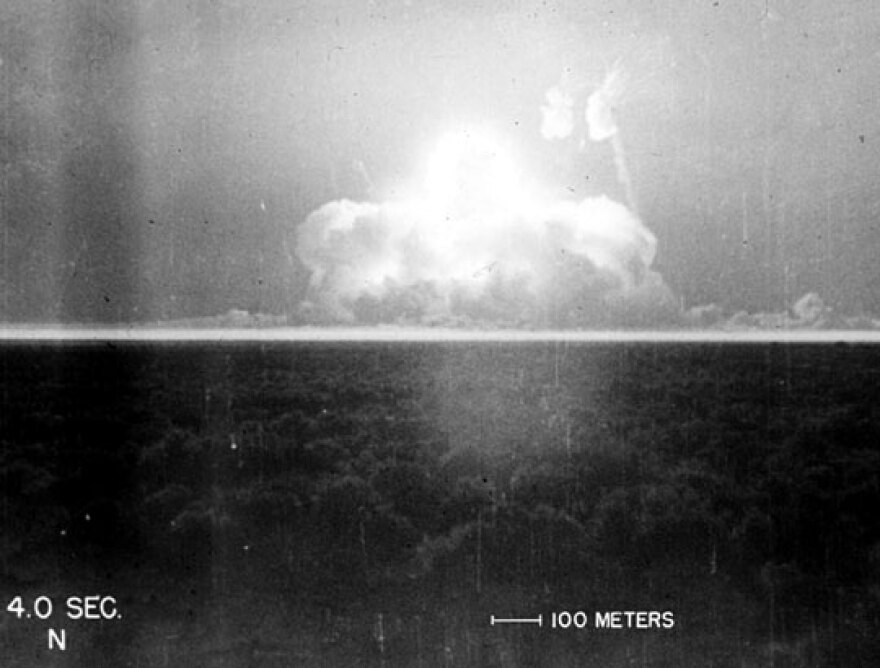New Mexico is where the atomic age began and the nuclear industry still looms large here, with Sandia National Laboratories and Los Alamos National Laboratory bringing significant economic impact.
But the Archbishop of Santa Fe wants the state, and the world, to forge a new way forward. Rev. John C. Wester issued a pastoral letter last month calling for total nuclear disarmament. Wester spoke to KUNM’s Megan Kamerick about how his perspective changed during a visit to cities in Japan where the United States dropped atomic bombs in World War II. This interview is an excerpt of a longer interview that will air on New Mexico in Focus Friday Feb. 25 at 7 p.m.
JOHN C. WESTER: It was just so horrific, especially with the children. I mean, the whole thing was difficult. But I read that the children saw the bright light, and they ran to the window to see what the light was, you know, and I can only imagine what happened either then or shortly after with the exposure to the radiation. And then coming back to Santa Fe and taking friends to the museums and all that and seeing well, here's where those very bombs were built and manufactured and sent off to Japan. So it just really touched me very deeply. And I felt that we should be, as the Catholic Archdiocese of Santa Fe, part of this conversation that would lead toward non-proliferation and nuclear disarmament.
KUNM: How did this trip, this realization affect your view of New Mexico's very large role in the creation of nuclear weapons and the state's ongoing role in this industry, through our national laboratories and other things?
WESTER: Obviously, on one level, I'm very proud of our laboratories, you know, LANL, and Sandia. These are wonderful scientists who are committed to science, committed to the country and doing you know, good things. But, on the other hand, you know, these are weapons of war, and we need to use this technology, the scientific know-how to get beyond nuclear wars. You know, even now, with the terrible tension between Russia and Ukraine and NATO and the West and the United States, it brings focus to the fact that these are the kinds of things that happen in our world and will happen. And so if we have nuclear weapons, and if we, heaven forbid, got to the point where we use them on each other, it would be catastrophic. And so I want this to be a conversation, not really a historical one about should we have dropped the bomb in Hiroshima and Nagasaki, but I want to be a conversation on: Should we work toward nuclear disarmament?
KUNM: New Mexico is a poor state, as you know, with very few industries producing well-paying jobs. The national laboratories represent billions of dollars of economic impact that includes businesses that rely on work with the labs. What if people face losing their livelihoods if disarmament brings an end to the nuclear industry here?
WESTER: I really firmly believe that this would not endanger that, because if we were really to pursue this nuclear disarmament, it would require even more from our labs, because that's going to take all kinds of technology to verify. That's a huge industry right there, to make sure that everybody has indeed disarmed and to make sure that we have ways that nobody could not come up with a nuclear bomb. And I think also there are many, many other things that our labs are already doing that promote life.
KUNM: That says a pastoral letter that you have issued, what is a pastoral letter, what kind of weight does it carry what goes into the decision by an archbishop to issue a pastoral letter?
WESTER: I mean, strictly speaking, passionately, was only back to St. Paul and St. James and St. John's pastoral letter is a letter written by a bishop to his flock to his people to the church, that local church. So for me, a pastoral letter would be, you know, as Archbishop of Santa Fe, I’m writing this letter to the people of God in the Archdiocese of Santa Fe, and I do have the idea that it hopefully will go beyond the archdiocese to be helpful there.
KUNM: And you say in your pastoral letter, that you want to start a statewide dialogue around these issues? How do you see these proceeding? What they look like?
WESTER: I would like to see our parishes, you know, maybe take this up as a topic. And I'd like to see us, you know, writing to our elected officials to, you know, express our concern about this issue. There's a lot written about it. People can educate themselves about the matter instead of just accepting what we hear. But to really go into it and invest to investigate it and read about it. We put in the letters a lot of practical things that people can do. I think that the more we think about it, pray about it, read about it, then we'll be able to kind of converse with others and to really talk about it.
KUNM: You want people being here who want to be talking about working in the industry or other issues.
WESTER: Exactly. I think that's very important. Because, you know, if you just talk to people agree with you, you don't get very far. I think it's more productive in a way, once we've done our homework to talk to people who do disagree.
KUNM: Archbishop Wester I appreciate you taking time to talk with us.






